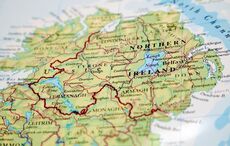The crisis in the power-sharing institutions in Northern Ireland has been brewing for some time. Yesterday, First Minister Peter Robinson resigned and took his party out of government but left on Minister Arlene Foster in situ as acting leader. That move may yet prove significant.
However, the future looms more uncertain than ever.
It all began following the murders of Kevin McGuigan and Jock Davison. There was a major falling-out between the two main parties, Sinn Féin and the Democratic Unionist Party (DUP), as to whether the IRA was involved in the revenge killing of McGuigan, a father of nine who was suspected of having a hand in the Davison murder.
Problems were already mounting before the killings. These two parties have been the mainstay of the power-sharing executive, which carries out governmental functions in the North. They reached a deal called the Stormont House Agreement last December which dealt with a number of issues including economy measures and other reforms in the field of social security as well as cuts in civil service jobs.
But Sinn Féin is now a political player in the Republic of Ireland where it has campaigned loudly against cutbacks in social security as well as other austerity measures introduced by the Fine Gael-Labour coalition government in Dublin.
Naturally, when the political opponents of Gerry Adams and his friends on the southern side of the Irish border saw what was happening in the North, they seized upon it eagerly to attack Sinn Féin.
The deeply-wounding taunt by the other political parties in the Republic was that Sinn Féin was opposing austerity in the South while implementing it in the North. The dangers for Sinn Féin with a general election coming up in the Republic were obvious.
Although there was no hint of the change in tack at the Sinn Féin ardfheis (annual conference) in Derry in early March, the policy reversal became apparent immediately afterwards. Sinn Féin pulled out of the Stormont House deal, accusing the Democratic Unionists of breaching the agreement – a charge that Peter Robinson's party hotly denied.
All this contributed to an uneasy climate as another tense summer loomed in Northern Ireland. As so often in that part of the world, violent acts serve to increase the level of ill-feeling between the two communities and their political representatives.
The killing of Gerard 'Jock' Davison (47) on May 5 came as a major shock. A leading Belfast republican, Davison was said to have been a senior commander of the Provisional IRA in the city. Ironically, his fatal shooting took place on the anniversary of the death of the IRA hunger-striker Bobby Sands in 1981.
Davison was not someone likely to endear himself to the general public. He was accused of involvement in the brutal stabbing of Robert McCartney outside a Belfast bar in 2005.
But he was highly-regarded by grassroots republicans in Belfast and is said to have played a major role in protecting the Catholic community when loyalist assassins were on the rampage in the city.
This man was a key figure in Belfast republicanism and his death was never likely to go unavenged. On August 12 Kevin McGuigan, another Belfast republican, was shot dead in an operation that was strongly reminiscent of IRA activities in the days before the peace process.
Before long, the Police Service of Northern Ireland (successor to the Royal Ulster Constabulary) was suggesting that IRA members were involved in the McGuigan shooting. But the police were unsure as to whether the 'hit' had been ordered by the IRA leadership or not.
'Wait a minute,' was the widespread reaction. A lot of people had been under the impression that the IRA was dissolved and no longer in existence. This was the Sinn Féin position, but nobody seemed to believe them any more.
The former justice minister in the Republic, Michael McDowell, said the Dublin government actually preferred to see the IRA remaining on the scene as an 'unarmed and withering husk' because this would make it easier to prevent the emergence of a dissident private army that would seek to restart the violent campaign against the British presence in the North.
Several people were brought in for questioning by the police in the North after the McGuigan killing. Some of them, perhaps all, were associated with the Provisional republican movement. There was consequent unease among the unionist parties in the power-sharing executive.
The Ulster Unionist Party withdrew its single solitary minister, Danny Kennedy, from his post as MInister for Regional Development. The UUP is currently led by Mike Nesbitt, formerly a well-known TV newscaster, who has shown himself to be an able political streetfighter.
This put enormous pressure on the Democratic Unionists, whose leader, Peter Robinson, is just back to work following a heart attack. Nesbitt was urging Robinson and Co. to follow his example and collapse the power-sharing set-up.
The Democratic Unionists were reluctant to allow Nesbitt to set the agenda. An election to the Assembly has to take place by next May at the latest and it would be disastrous for the DUP if Nesbitt went into the contest as unionism's 'top dog'.
But then one of the most senior Belfast republicans, Bobby Storey, who is chairman of Sinn Fein in the North, was taken in in for questioning with two other men.
That was the last straw, even though Storey was later released. The options were narrowing and Robinson and Co sought to have the Northern Ireland Assembly adjourned while crisis talks took place on the situation. But they didn't have the numbers to do this on their own.
The head of government in Dublin,Taoiseach Enda Kenny, is said to have asked the moderate nationalist Social Democratic and Labour Party (SDLP) to cooperate with the DUP in securing an adjournment. This was refused and, as a result, DUP leader Robinson announced he would be stepping aside as First Minister.
His colleague Arlene Foster is to take over the role on a temporary basis, in addition to her existing role as Finance Minister, but all the other DUP ministers are also stepping down. Enda Kenny said Ms Foster would be temporary first minister for the next six to eight weeks.
Britain's Secretary of State for Northern Ireland,Theresa Villiers, said she would not be suspending the power-sharing institutions, and urged the parties to come together to reach an agreement on the way forward.
Dublin's Minister for Foreign Affairs and Trade Charlie Flanagan said: 'What we want is for the devolved power-sharing Executive and Assembly to work as envisaged in the Good Friday Agreement and deliver peace, prosperity and reconciliation for the people of Northern Ireland.'
He added that, 'the power-sharing institutions are on the edge of the precipice.' Few people would disagree with him on that.
While the latest developments constitute a setback for the peace process, it does not mean a return to the bad old days of the Troubles anytime soon. However, it is a serious blow to the efforts by the British and Irish governments, backed-up by successive US administrations, to ensure that Northern Ireland becomes a stable, peaceful society where differences and difficulties are resolved by democratic means and there is no resort to violence.
Sinn Féin is in a difficult position as its political opponents in the Republic will be claiming that the party has still not severed its links with the violent ways of the past and that the IRA is still lurking in the shadows. The next general election in the Republic is due to take place between now and the beginning of April. If Sinn Féin gets enough support from voters, it could end up as the largest opposition party or even become a partner in the next coalition government. The stakes are high in both parts of the island for the politicians and everyone else.
* Deaglán de Bréadún former Northern Editor of The Irish Times is the author of a forthcoming book, 'Power Play: The Rise of Modern Sinn Fein' to be published by Merrion Press in Dublin.




Comments